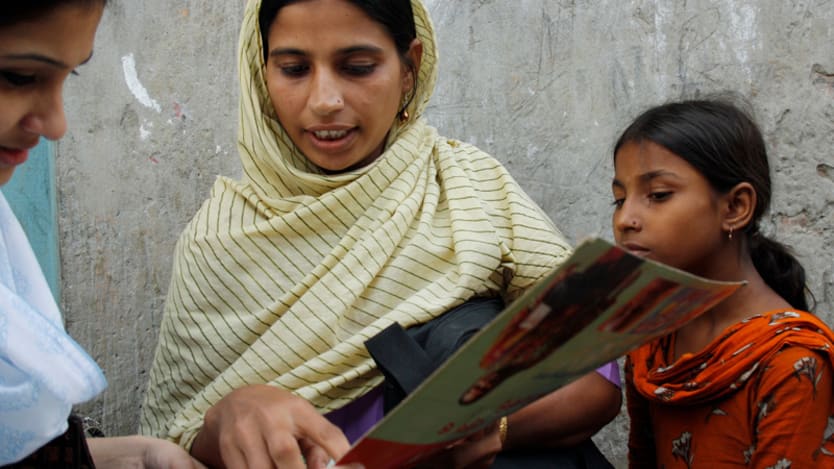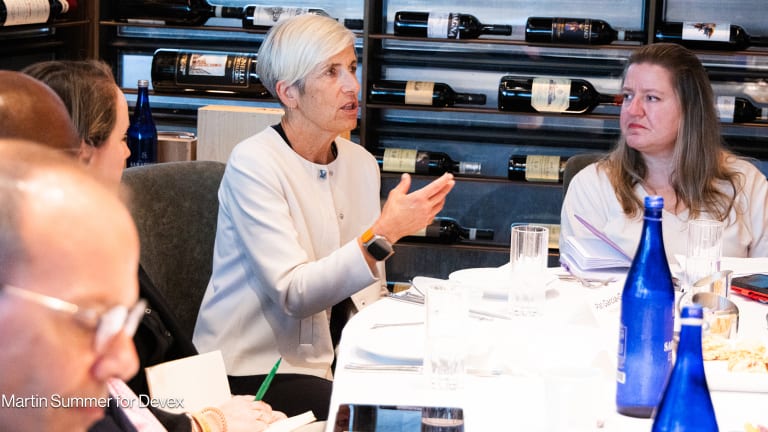
By 2030, poorer countries could be short of 18 million health workers. A report from a World Health Organization commission has called for urgent action to plug this gap. Not only do we need to invest in health workers to help people live healthier lives, but also to spur economic growth.
Health workers help shape healthy communities, which in turn can drive thriving economies. If countries don’t invest in health workers, efforts to meet the Sustainable Development Goals — which set out an ambitious agenda to improve health and prosperity — could be jeopardized.
Putting health workers front and center of effective health systems is a challenge that no single organization or sector can take on alone. Since 2010, CARE International and GlaxoSmithKline PLC, for example, have been working together in Asia to help swell the ranks of skilled front-line health workers.
Funding insight
GSK reinvests 20 percent of its profits made in least developed countries back into strengthening their health systems. This gives CARE a sustainable source of funds that can be invested in health worker training and community education programs. It’s a virtuous circle — the more GSK’s business grows, the more there is to reinvest. Over the past seven years, GSK has reinvested 21 million pounds ($27.3 million) in 35 countries, supporting training of more than 40,000 frontline health workers in partnership with CARE International, Amref Health Africa and Save the Children. Over 20,000 health workers have been trained in Asia alone.
Here are three lessons we’ve learned about how to work in innovative partnerships to strengthen health infrastructures:
1. Unexpected alliances are worth pursuing.
A partnership between an international nongovernmental organization and a global health care company might once have been unexpected or unusual. But there are mutual benefits. Both want to create a robust health ecosystem where people can access and seek the care they need, in the right time and place. By bringing together resources, we are better placed to achieve this.
2. Don’t be afraid to test out new models.
Business as usual will not be sufficient to curb the deficit of health workers in poorer countries — new models are required and we need to be brave enough to try these out.
In the remote Sunamganj region of Bangladesh, which is underwater for almost half the year, only 11 percent of births were assisted by a skilled health worker in 2012. To help change that, a program to train a team of private community-based midwives was developed that complements public provision and enables women to supplement their income as well as develop new skills.
The midwives charge a small tariff for their services, which is set by the government in consultation with the community. If someone cannot afford to pay, the birth attendant might help them for free, or a local support group or local government may help out by paying or enabling the patient to cover the costs over time.
There are challenges to this model. Arguably it is preferable for health workers to be salaried by the government. But this does not always happen. By developing the skills and confidence of this private cadre, the program aims to enable health workers to forge a livelihood and communities to create viable payment mechanisms; and create an evidence base for investing in health workers, catalyzing support from governments and other quarters.
“Effective partnerships have to think beyond the life span of their collaboration, strengthening capacities and capabilities for the long term.”
— Daryl Burnaby, director for front-line health worker programs at GSK, and Tom Sessions, head of strategic partnerships at CARE InternationalSo far, the results give us confidence. In 2015, the number of births attended by a skilled health worker stood at 50 percent in the Sunamganj program area. Half of those births were managed by CARE-trained birth attendants. Building on that, we are now scaling up the program across the rest of Sunamganj and aim to train 300 midwives by 2018.
3. Think beyond the parameters of your partnership.
Effective partnerships have to think beyond the life span of their collaboration, strengthening capacities and capabilities for the long term. The process we take is to work hand-in-hand with communities and government to understand their priorities. This can be a tough and lengthy process. But it’s worthwhile. In Bangladesh, the private midwives maintain a link to the formal system through working with different providers of government health services.
This approach helps our programs to have an enduring impact and provides a solid foundation on which to scale up. In Cambodia, where GSK and CARE International have worked together for four years, we have just expanded our program, including launching a new project with two other NGOs — Room to Read and Plan International. This will extend our health worker training program beyond mothers and babies into supporting adolescents, who make up 35 percent of the population in Cambodia.
Not only will this program enable health workers to educate and raise health awareness — particularly around sexual and reproductive health — among adolescents, but it will also take health education beyond the health system and into other environments. Health workers will head into factories and schools to reach young people directly with these messages and empower them to take care of their own health and well-being.
Broadening out our initial collaboration to include other organisations and sectors is a new — but necessary — step, not just for our partnership but for others too. As the Sustainable Development Goals recognize, health, education and prosperity are all inextricably linked. One cannot be achieved without the other. So we all need to think laterally, going beyond the usual parameters of our partnerships, if the sustainable development agenda is to be truly realized.
Making Markets Work is an online conversation to explore what’s being done to make global health care markets accessible to people at the base of the pyramid. Over 10 weeks, Devex and its partners — The Abraaj Group, Philips and Population Services International — will amplify the discussion around effective health financing, analyze key challenges blocking universal market access in the health care supply chain, and explore the key strategies to make markets more effective. Join us as we look at this important issue, and share your thoughts by tagging #MakingMarketsWork and @Devex.









